
Vomero is a bustling hilltop district of metropolitan Naples, Italy — comprising approximately two square kilometres (0.77 sq mi) and a population of 48,000.

Castel Capuano is a castle in Naples, southern Italy. It takes its name from the fact that it was at that point in the city walls where the road led out to the city of Capua. The castle is at the southwest end of via dei Tribunali, and until recently housed the Naples Hall of Justice, which has now moved to the new Civic Center, the Centro Direzionale.

The Centro direzionale is a business district in Naples, Italy close to the Napoli Centrale railway station. Designed by the Japanese architect Kenzō Tange, the entire complex was completed in 1995. It is the first cluster of skyscrapers to have been built in Italy or southern Europe.

Avvocata is a quarter of Naples, southern Italy. It is just outside, to the west, of the original historic centre of the Greco-Roman city of Naples. It is the first area beyond the original city developed under the Spanish viceroyship when the Spanish moved into the Kingdom of Naples in the mid-16th century. The most prominent landmark in the area is the large square, Piazza Dante.

Mercato is a neighbourhood or quartiere of Naples, southern Italy. It is in the southeastern part of the city, bounded by the industrial port of Naples on the south.
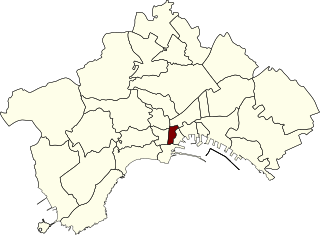
San Giuseppe is a quartiere or neighbourhood of Naples, southern Italy, which includes many of the points of interest on the western side of the historic centre of the city, including the square and church of Gesù Nuovo, the buildings along via Benedetto Croce and the square, Piazza San Domenico Maggiore.
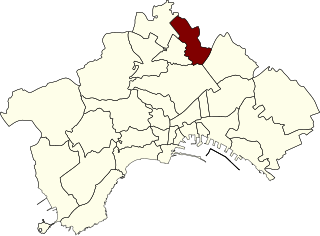
Secondigliano is a modern suburb in the north of Naples, Campania, Italy. It is part of the 7th municipality of Naples, along with the suburbs of Miano and San Pietro a Patierno.

The Four Days of Naples was an uprising in Naples, Italy, against Nazi German occupation forces from September 27 to September 30, 1943, immediately prior to the arrival of Allied forces in Naples on October 1 during World War II.
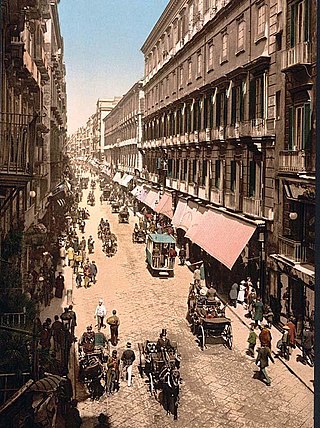
Via Toledo is an ancient street and one of the most important shopping thoroughfares in the city of Naples, Italy. The street is almost 1.2 kilometres (0.75 mi) long and starts at Piazza Dante and ends in Piazza Trieste e Trento, near Piazza del Plebiscito.
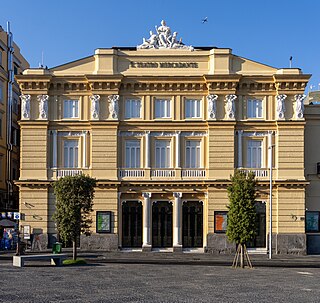
The Teatro Mercadante, earlier known as Teatro del Fondo, is a theatre in Naples, Italy. It is located on Piazza del Municipio #1, with the front facing the west side of Castel Nuovo and near the Maritime Station. Together with the Teatro San Carlo, it was originally one of the two royal opera houses of the 18th and 19th-century city.

San Michele Arcangelo or San Michele a Port'Alba is one of four major churches facing Piazza Dante in Naples, Italy. It stands near Port'Alba, a city gate opening to the piazza.

The Fountain of Neptune is a monumental fountain, located in Municipio square, in Naples, Italy. The fountain until the end of 2014 was located across the street of via Medina across from the church of Santa Maria Incoronata, Naples and a few doors south of the church complex of Pieta di Turchini. Now the fountain is located in front of the Town hill building, its location changed due to the construction of the new underground station.
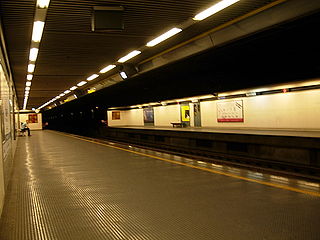
Vanvitelli is an underground metro station that serves Line 1 on the Naples Metro. It was opened on 28 May 1993 as the southern terminus of the inaugural section of Naples Metro, between Vanvitelli and Colli Aminei. On 5 April 2001, the line was extended to Museo, and Vanvitelli ceased to be the terminus.

San Gennaro al Vomero is a Neoclassic-style church, located on the corner of via Solimena and via Giovanni Bernini, near the piazza Vanvitelli in Naples, Italy.

The Porta Nolana is the remnant of one of the medieval city gates in Naples, Italy. It is located in Piazza Nolana, near a local train station, Napoli Porta Nolana with the Circumvesuviana lines, and a bustling local pedestrian market, Mercato di Porta Nolano, known for seafood. It takes its name from the road that lead to Nola.

The Caffè Gambrinus is a historic, private cafe or coffeehouse in Central Naples, Italy on via Chiaia. It is located in the rear of the Palazzo della Prefettura, which lies in front and to side of the Royal Palace of Naples, both of which face the Piazza del Plebiscito. The name Gambrinus is a legendary somewhat tipsy figure of joviality, and his name is used for various brands and many establishments.
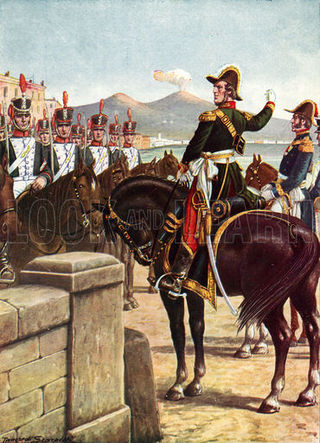
The Ponte della Maddalena was a bridge on the south east of Naples, Italy, spanning over what was once the River Sebeto, and now reflected by the path of the Via Marinella. For centuries it was one of the entry points into Naples from the South, but was obliterated during the late 19th-century urban renewal of the city.

Medaglie d'Oro is a station on line 1 of the Naples Metro. It was opened on 28 May 1993 as part of the inaugural section of Naples Metro, between Vanvitelli and Colli Aminei. The station is located between Vanvitelli and Montedonzelli.

Materdei is a station on Line 1 of the Naples Metro and is located in Piazza Scipione Ammirato in Naples. According to the British newspaper The Daily Telegraph it was ranked in 16th place as the most beautiful metro station in Europe.
Di Vittorio will be a station on Line 1 of the Naples Metro and on Line 11 of the railway network managed by EAV. It is located in the Secondigliano district, between Piazza Giuseppe Di Vittorio and Viale Comandante Umberto Maddalena.



















